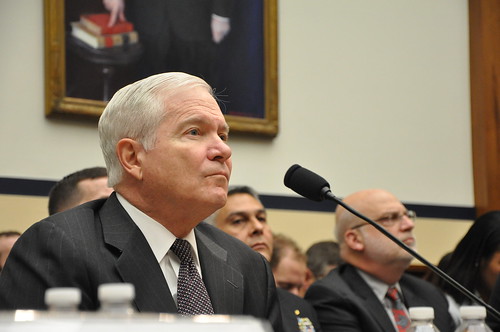WASHINGTON—Secretary of Defense Robert Gates supported moderate cuts in the defense budget Wednesday but warned Congress that “short-sighted cuts could well lead to costlier and more tragic consequences later – indeed as they have in the past.”
Gates, joined by Chairman of the Joint Chiefs of Staff, Adm. Mike Mullen, asked for a defense budget of $553 billion for the 2012 fiscal year, accompanied by $118 billion for overseas contingency operations. However, both officials urged Congress to pass a new defense budget for the current fiscal year to replace the continuing resolution that has the Pentagon operating on last year’s budget of $526 billion.
“Based on a number of factors—including policy changes that led to lower personnel costs and reduced activity forced by the continuing resolution—I believe the department can get by with a lower number,” Gates said. “However, it is my judgment that the Department of Defense needs an appropriation of at least $540 billion for fiscal year 2011.”
The record deficits continue to play a pivotal role in government spending, and in response, the Pentagon officials proposed a $78 billion reduction in the defense budget over the next five years. This move has been met with some controversy as the cut will result in a reduction of the Army and Marine Corps by up to 47,000 persons. Even so, Gates maintains that the plan can be carried out with minimal risk.
“These projections assume that the number of troops in Afghanistan would be significantly reduced by the end of 2015, in accordance with the president’s and NATO’s strategy,” Gates said. “If our assumption proves incorrect or world conditions change for the worse, there’s plenty of time to adjust the size and schedule of this change.”
Mullen said the national debt “is the greatest threat to national security.” However, he said cuts in Pentagon spending must not impair the effectiveness of the Defense Department.
“If we as a country do not address our fiscal imbalances in the near-term, our national power will erode, and the costs to our ability to maintain and sustain influence could be great,” Mullen said. “We must carefully and deliberately balance the imperatives of a constrained budget environment with the requirements we place on our military in sustaining and enhancing our security.”


